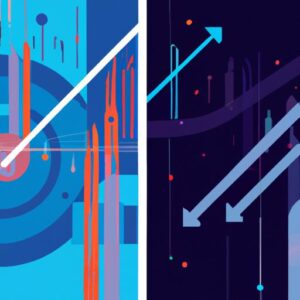Introduction
In the vast landscape of data-driven careers, two prominent roles often stand out – data scientists and data analysts. But what sets these professionals apart, and why are they crucial in today’s digital realm? Let’s delve into the defining characteristics of these roles and explore their significance in shaping the data landscape.
Defining Data Scientist and Data Analyst
At the core, a data scientist is a skilled individual who dives deep into complex datasets to extract insights, build predictive models, and drive strategic decision-making. On the other hand, a data analyst focuses on interpreting data to identify trends, patterns, and anomalies, providing valuable information to support business objectives.
Importance in the Digital World
In an era where data reigns supreme, the expertise of data scientists and data analysts is indispensable. Businesses rely on their analytical prowess to unlock the potential of data, optimize processes, and gain a competitive edge in the market. As technology continues to evolve, the demand for skilled data professionals only grows, underlining their significance in driving innovation and growth.
Education and Skills Required
Educational Background
When embarking on a career as a data scientist or data analyst, a solid educational foundation is essential. Data scientists typically hold advanced degrees in fields such as computer science, mathematics, or statistics, equipping them with the analytical prowess needed to tackle complex datasets. On the other hand, data analysts may have bachelor’s degrees in related fields like economics, business, or information technology, providing them with a strong understanding of data interpretation and analysis.
Technical Skills
In the realm of data science and data analysis, technical skills play a pivotal role in success. Data scientists often excel in programming languages such as Python, R, or SQL, enabling them to manipulate data and build sophisticated models. Data analysts, on the other hand, may focus on tools like Excel, Tableau, or Power BI to visualize data and extract meaningful insights. Proficiency in data visualization, machine learning, and database management are also essential technical skills for both roles.
Soft Skills
Beyond technical expertise, soft skills are equally important for data professionals. Effective communication skills allow data scientists and data analysts to convey complex findings in a clear and concise manner, bridging the gap between data and decision-makers. Critical thinking, problem-solving abilities, and attention to detail are also crucial traits that enable data professionals to navigate intricate datasets and derive actionable insights.
Job Responsibilities
Data Scientists
Data scientists play a pivotal role in organizations by leveraging their expertise in statistics, machine learning, and programming to extract actionable insights from vast and complex datasets. Their responsibilities often include data collection, cleaning, and analysis, as well as developing predictive models and algorithms to solve business problems. Data scientists are also adept at visualizing data to communicate findings effectively to stakeholders and drive data-driven decision-making processes.
Data Analysts
Data analysts, on the other hand, focus on interpreting data to identify trends, patterns, and correlations that can provide valuable insights to support business objectives. Their tasks typically involve data cleaning and transformation, creating reports and dashboards, conducting statistical analysis, and monitoring data quality. Data analysts are skilled in using tools such as SQL, Excel, and Tableau to extract and present data in a clear and meaningful way for decision-makers.
Key Differences
While both data scientists and data analysts work with data, their scope of work and objectives differ significantly. Data scientists are more focused on building and implementing complex models to predict future outcomes and drive strategic decisions, while data analysts concentrate on interpreting data to provide insights that can guide operational decisions. Understanding these distinctions is crucial for businesses looking to harness the full potential of their data and optimize their analytical processes.
Tools and Technologies
Tools for Data Scientists
Data scientists leverage a myriad of tools to analyze and manipulate vast datasets effectively. Common tools include programming languages like Python and R, statistical software such as SAS and SPSS, visualization tools like Tableau and Power BI, and machine learning frameworks such as TensorFlow and scikit-learn. These tools enable data scientists to extract valuable insights, develop predictive models, and derive actionable recommendations to drive business decisions.
Tools for Data Analysts
In contrast, data analysts utilize a different set of tools tailored to their role’s requirements. Excel, SQL, and BI tools like Microsoft Power Query and Google Data Studio are essential for data analysts to clean and organize data, perform ad-hoc analysis, and create insightful visualizations. These tools empower data analysts to uncover trends, patterns, and correlations within datasets, providing valuable insights for stakeholders across the organization.
Differences in Tools and Technologies
While there is some overlap in the tools used by data scientists and data analysts, the key difference lies in the complexity and depth of analysis each role undertakes. Data scientists typically work with more advanced tools and technologies to handle large-scale datasets, implement machine learning algorithms, and develop sophisticated models. On the other hand, data analysts focus on utilizing tools that facilitate data exploration, visualization, and reporting to deliver actionable insights tailored to specific business needs. Understanding these distinctions is crucial in optimizing the use of tools and technologies to maximize the impact of data-driven initiatives.
Salary and Career Growth
Average Salary Range for Data Scientists
When it comes to compensation, data scientists command impressive salaries, reflecting the specialized skills and expertise they bring to the table. On average, data scientists can expect a salary range that varies based on factors such as experience, location, and industry. According to recent surveys, the median salary for data scientists in the United States falls within the six-figure range, making it a lucrative career path for those with a passion for data analysis and problem-solving.
Average Salary Range for Data Analysts
Similarly, data analysts also enjoy competitive salaries, albeit typically slightly lower than those of data scientists. The average salary range for data analysts varies depending on factors such as experience, education, and industry. Despite the nuanced differences in pay scales between data scientists and data analysts, both roles offer rewarding compensation packages that reflect the value of their analytical skills and contributions to organizations.
Opportunities for Career Advancement in Both Roles
Beyond competitive salaries, data scientists and data analysts also have ample opportunities for career advancement. As they gain experience and expertise in their respective fields, professionals in these roles can progress to more senior positions, take on leadership roles, or specialize in niche areas of data analysis. Continuous learning, upskilling, and staying abreast of industry trends are essential for unlocking new opportunities and advancing one’s career trajectory as a data professional.
Conclusion
As we wrap up our exploration of the difference between data scientists and data analysts, one thing becomes clear – both roles play a vital part in the data ecosystem. While data scientists harness the power of advanced algorithms and machine learning to derive valuable insights, data analysts excel in translating data into actionable recommendations for business success.
Understanding the nuances between these roles is crucial for aspiring data professionals. By honing the necessary skills and staying abreast of industry trends, individuals can carve a rewarding career path in the dynamic world of data. Whether you aspire to unravel complex datasets as a data scientist or uncover meaningful patterns as a data analyst, the opportunities for growth and impact are boundless in this data-driven era. Embrace the journey, seize the opportunities, and make your mark in the ever-evolving realm of data analytics.




